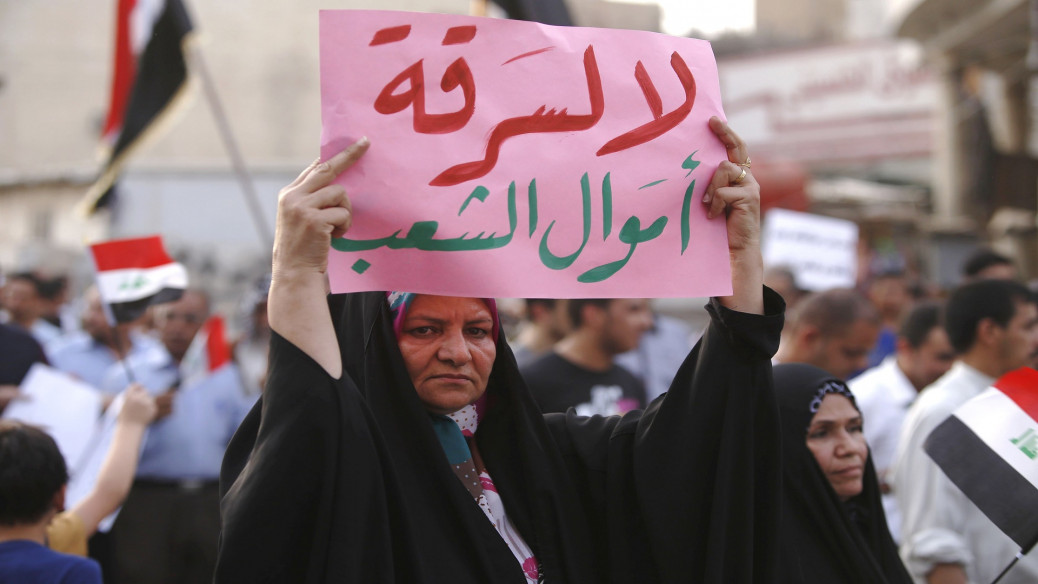Iraq’s Deepening Corruption Crisis Fuels Public Outrage: Citizens Demand Justice and Reform
"Lawmakers and enforcers are both corrupt—who will hold them accountable?" a Baghdad resident asked. "An MP earns 10 million dinars for doing little, while a veteran gets just 400,000 in retirement. Is that justice?"

ERBIL (Kurdistan24) — Iraqis are voicing growing anger over the country’s entrenched financial corruption, urging the government to take firm action against corrupt officials as public services deteriorate and inequality widens. Transparency International reports that corruption affects 26% of Iraq’s institutions, prompting the Prime Minister to call for reforming financial laws to confront the crisis.
Across Baghdad’s streets, everyday conversations reflect the public’s mounting frustration. Citizens frequently share stories of bribes, bureaucratic negligence, and lack of accountability. When media crews appear on the streets with cameras and microphones, Iraqis often request their stories be told—stories of neglect, exploitation, and injustice.
“I swear corruption has reached its peak,” said Jasim Mohammed, a Baghdad resident, in an interview with Kurdistan24. “The Ministry of Health is the most corrupt. Just yesterday, my family member fell ill. When I rushed them to the hospital, there was no stretcher, no basic equipment. I had to carry them myself, and there were no IV drips or even cannulas available—I had to buy them outside. Where is all of Iraq’s money going?”
Ahmad Maliki, another citizen, was even more direct in his criticism. “Both the lawmakers and those enforcing the law are corrupt. Who’s going to punish whom? A member of parliament barely works and gets 10 million dinars a month. Meanwhile, a veteran with 25 years of service receives just 400,000 dinars in retirement. Is this what justice looks like?”
Transparency International’s latest data highlights that one in four public transactions in Iraq is tainted by corruption. The organization’s findings have intensified pressure on the government, leading Prime Minister Mohammed Shia’ al-Sudani to push for new financial legislation aimed at increasing transparency and reducing misuse of public funds.
According to a recent disclosure from Iraq’s Federal Ministry of Finance to parliament, since 2003, over $450 billion worth of budget allocations remain unaccounted for—a staggering 40% of the country’s overall annual budgets during the past two decades.
Political analyst Abbas Roufai told Kurdistan24, “Systems, laws, and awareness all play a role in curbing corruption. But in Iraq, these mechanisms are not implemented. Salaries and allowances for senior officials should also be reduced to restore fairness and stop financial waste.”
Recent reports show that the monthly salaries and medical allowances of senior ministry officials can reach as high as 129 million Iraqi dinars, further fueling public resentment. Many Iraqis argue that unless lavish spending is curbed and corrupt elites are held accountable, reform will remain a slogan with no substance.
Corruption has plagued Iraq since the fall of Saddam Hussein in 2003, becoming deeply embedded within state institutions. Despite successive governments pledging reforms, progress has been minimal. The 2019 antigovernmental protests saw hundreds of thousands demand jobs, better services, and an end to corruption. The movement led to the resignation of Prime Minister Adel Abdul Mahdi but failed to deliver systemic change.
The post-2003 political system, based on sectarian power-sharing, has often fostered nepotism and patronage networks, making accountability nearly impossible. With the state apparatus bloated and inefficient, much of Iraq’s oil wealth—its primary source of revenue—fails to translate into improved public services or infrastructure.
As the country faces mounting economic and political pressures, the call for transparency, justice, and meaningful reform grows louder. But without structural change and political will, Iraqis fear the cycle of corruption will continue to cripple their future.
Kurdistan24 correspondent in Baghdad, Shivan Jabari, contributed to this report.